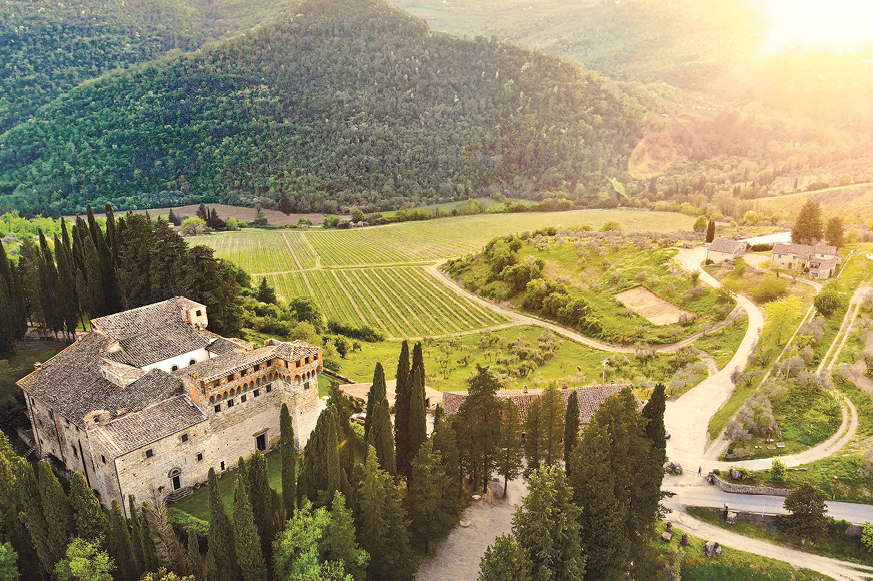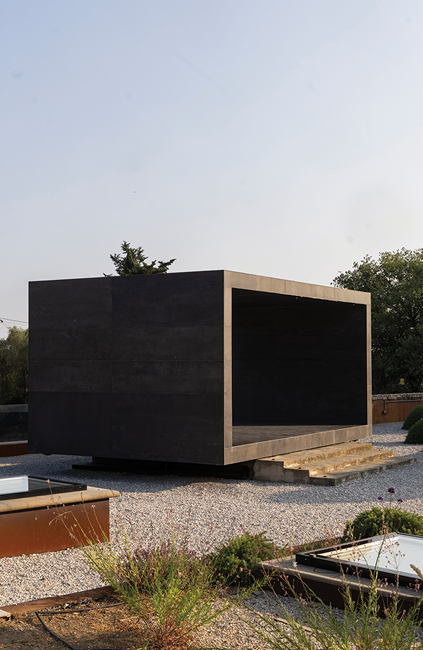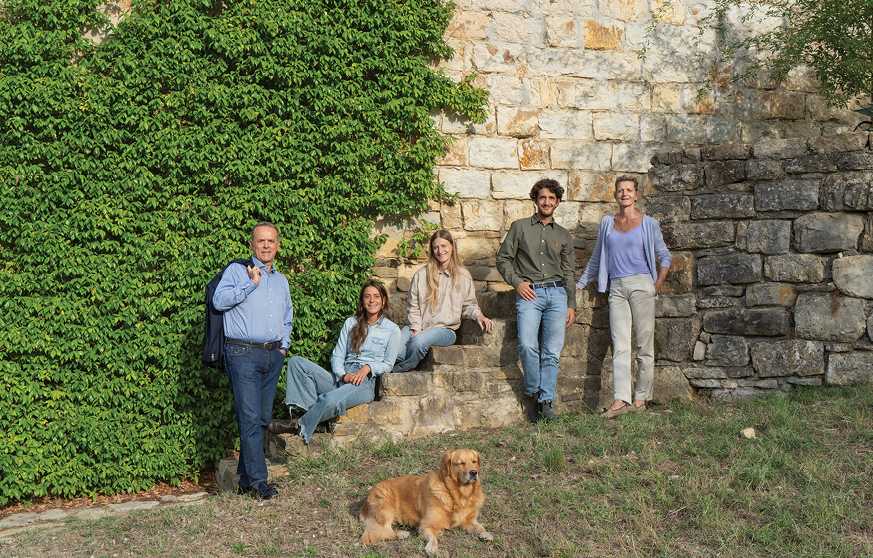- Home
- Media Kit
- MediaJet
- Current Issue
- Past Issues
- Ad Specs-Submission
- Reprints (PDF)
- Photo Specifications (PDF)
- Contact Us
- PRIVACY POLICY
- TERMS OF USE
![]()
ONLINE
![]()
ONLINE

A Vision Of
The World
Editors’ Note
Stefano Casadei was born and raised in the sun-drenched Tuscan fields. Son of an agronomist, he grew up amidst crops, meadows, and the values of Tuscany’s rural tradition. Passionate about wine, he studied agriculture in Italy and then attended advanced courses at the University of Bordeaux in France. Soon after specializing, he became a creative and enthusiastic wine entrepreneur. Today, Casadei is the owner and technical director of wineries in Maremma, Chianti and Sardinia. President and founder of Tecnovite, he directs the BioIntegrale technical-scientific team which works to safeguard biodiversity and promote ethical and sustainable farming.
Company Brief
The story of Famiglia Casadei (famigliacasadei.it) is one of sound, hardworking entrepreneurship and, at the same time, the story of the Casadei family. The family has written this story, vintage after vintage, in the name of respect for nature, with roots firmly planted in the soil and its gaze focused on the future. Today, Famiglia Casadei stands as a haven of biodiversity and culture, and continues to strive to be a trustworthy custodian and interpreter of the spirit of the places where it produces.

Castello del Trebbio
Will you discuss your career journey?
My professional path was born from the soil, not from books. Since I was a child, I’ve lived the countryside as a vibrant place – made of work, yes, but also of relationships, culture, and emotion. My father was an agronomist and managed farms on behalf of others. During harvest days, what formed around me wasn’t just work – it was community, tradition, and identity. After studying agricultural sciences, I worked for five years at a multinational company in the agri-chemical sector. It was a formative experience, especially because it helped me understand what I didn’t want to do: industrial agriculture, detached from the rhythms of nature. So, I changed course. I went back to study, first in Italy and then in Bordeaux, where I found a deeper, more cultural approach that honored natural cycles. At 30, I felt the urge to deepen my relationship with wine. Those specialized courses at the University of Bordeaux – one of the great temples of viticulture – gave me valuable tools. But the real school has always been, and still is, the vineyard. Every vintage is a lesson, every harvest a new chapter. I’ve learned to listen to the land, to accept its silences and surprises, and to do less in order to achieve more.
Over time, together with my family, we built a project grounded in a clear philosophy – BioIntegrale – and in a strong belief: that agriculture must return to center stage. All of our estates are now cultivated biodynamically, and we are fully committed to regenerative farming: restoring soil health, preserving biodiversity, ensuring people’s well-being, and honoring the places where we work. It’s a complex path, requiring vision, consistency, and patience. But for me, it’s the only way to do this work: with passion, responsibility, and a deep sense of belonging to the earth.

Canocchiale Tenuta Casadei
Will you highlight the history of Famiglia Casadei?
The first real step was Castello del Trebbio, in Chianti Rufina – an extraordinary place, rich in history. It was here that the Pazzi Conspiracy took place. My wife, Anna Baj Macario, inherited the castle from her parents and chose, with great dedication and sacrifice, to preserve and enhance it. Today, Castello del Trebbio is a benchmark for wine tourism and a key producer of both wine and olive oil. It was from here, as I mentioned, that Anna and I began to put down roots – blending past and future.
Then came the other estates: Tenuta Casadei, in the Alta Maremma, was born from a desire to create a project dedicated to international grape varieties interpreted through a Mediterranean lens, after the experience with Sangiovese at Castello del Trebbio. Suvereto was the natural choice, and our Cabernet Franc “Filare 18” is the perfect expression of that vision. This estate is especially meaningful to us as it is co-owned with the Cline family, dear friends and partners in the U.S. who not only import wines from all our estates, but also deeply share our values. This partnership has grown into a genuine and lasting bond.
Next is Olianas, located in the most authentic heart of Sardinia – a pristine, untouched place where every visitor is enchanted by its natural beauty and atmosphere. It’s also the only Demeter-certified estate in Sardinia, representing our full commitment to biodynamic and regenerative agriculture. Here, we work exclusively with native varieties in harmony with the environment.
Lastly, Terre di Romena, in Casentino, is our most recent estate, dedicated to Pinot Noir and Chardonnay. It’s a mystical place, chosen for its unique potential in the face of climate change.
Today, with my wife and our three children – each of whom plays a different role within Famiglia Casadei – we continue to pursue a project that is, above all, a vision of the world: to farm ethically, to leave the land better than we found it, and to produce wines that have a soul.

The Casadei family
Will you provide an overview of Famiglia Casadei’s collection of distinctive wine estates?
Famiglia Casadei is today a mosaic of four estates, each with a distinct identity yet united by the same vision: practicing biodynamic, regenerative agriculture guided by the BioIntegrale philosophy.
• Castello del Trebbio (Chianti Rufina, Tuscany): This is the most historic and largest estate. It produces around 350,000 bottles per year, with a focus on the expressive purity of Sangiovese. Here, viticulture, history, tourism, and culture intertwine in a uniquely architectural and scenic setting.
• Tenuta Casadei (Upper Maremma, Tuscany): Producing around 150,000 bottles, mainly from international grape varieties such as Cabernet Franc, Syrah, Petit Verdot, and Viognier. This is an identity-driven project that combines the strength of the Mediterranean terroir with an elegant, contemporary style. Since the late 1990s, we’ve pioneered the use of terracotta amphorae – a choice that has since become a trend.
• Olianas (Sardinia): Nestled in the island’s most authentic heart, it produces around 180,000 bottles from native varieties such as Cannonau, Vermentino, and Bovale. Agriculture here is truly regenerative, in an unspoiled environment, with animal traction, organic compost, and biodiversity as central values.
• Terre di Romena (Casentino, Tuscany): The most recent estate, a small gem producing 20,000 bottles annually. Here we cultivate Pinot Noir and Chardonnay in a surprisingly favorable microclimate for these varieties, resulting in elegant, vertical wines deeply connected to the land.
In total, we produce around 700,000 bottles per year, distributed worldwide, with particular attention to markets that share our values: authenticity, quality, and respect for the earth.
Will you elaborate on Famiglia Casadei’s commitment to sustainability?
Absolutely yes, because sustainability is our direction, not a destination. It is a foundational principle of our project, which concerns not only the environment, but also people, territories, agriculture, culture, and the very meaning of our work. Since 2013, we have developed and adopted our BioIntegrale philosophy, a holistic and rigorous approach that goes beyond organic or biodynamic farming. It is based on a precise decalogue that embraces soil regeneration, the enhancement of biodiversity, respect for natural rhythms, as well as a strong social, cultural, and economic responsibility toward the places where we operate.
One of the key points requires that only people from the local territory work in each of our estates. The choice of suppliers also follows the same ethical principle: they all operate within a maximum radius of 30 kilometers from the estate, to support local economies, reduce environmental impact, and contribute to a genuine redistribution of wealth in the area.
Our idea of sustainability also reflects on the energy front: each estate is self-sufficient in terms of electricity, thanks to photovoltaic panels perfectly integrated into the architecture, without visual impact on the landscape.
Then there is cultural sustainability. At Castello del Trebbio, for example, we are custodians of history. The castle dates back to 1184 and is a place of great historical value: it is where the famous Pazzi Conspiracy against the Medici took place. Our duty is to preserve it, keep it alive in the present, and hand it down to future generations – not just as a monument, but as a living space where history, wine, and culture meet.
Finally, we recover ancient practices – such as the use of terracotta amphorae, which we introduced as early as the late 1990s – and reinterpret them in light of modern technical knowledge, because one of the foundations of BioIntegrale is precisely this: innovating by rediscovering our roots.
In summary, for Famiglia Casadei sustainability is not only environmental: it is human, historical, agricultural, energetic, and cultural. It is a daily responsibility that guides every choice we make – from the vineyard to the cellar, from the people to the places.
What has made the wine industry so special for you?
I will conclude by repeating what I have already said. For me, wine has never been just a product: it has always been a language. I have already shared that since I was a child, I experienced the land as a living place, full of gestures, stories, and people who knew how to listen to the rhythms of nature. I have also mentioned that I grew up in a family where, thanks to my father who was an agronomist, agriculture was part of our daily life. Over time, I realized that I didn’t want to just practice agriculture – I wanted to do it differently, in a way that produced beauty, fostered relationships, culture, and emotions.
Wine has been the perfect instrument for this, because wine is slowness, observation, listening. It is the fruit of a silent dialogue with the land, a balance between what you can control and what you must simply accept. And then it is sharing: around a bottle, stories are told, bonds are created. Wine has the power to bring people together, to speak many languages, yet remain deeply connected to a place.
Over time, together with my wife Anna and my family, I have built a project that starts from here: from the land, from the people, from respect. With our BioIntegrale philosophy and now regenerative agriculture, we strive every day to give back to nature, not just take from it. This is what makes wine special to me: the fact that, if done with awareness and love, it can become an agricultural, cultural, and even spiritual act.
And today, seeing my children choose to be part of this journey – each with their own perspective and sensitivity – is perhaps the greatest gift. Because it means that wine, in our family, is not just a job: it is a way of being.![]()